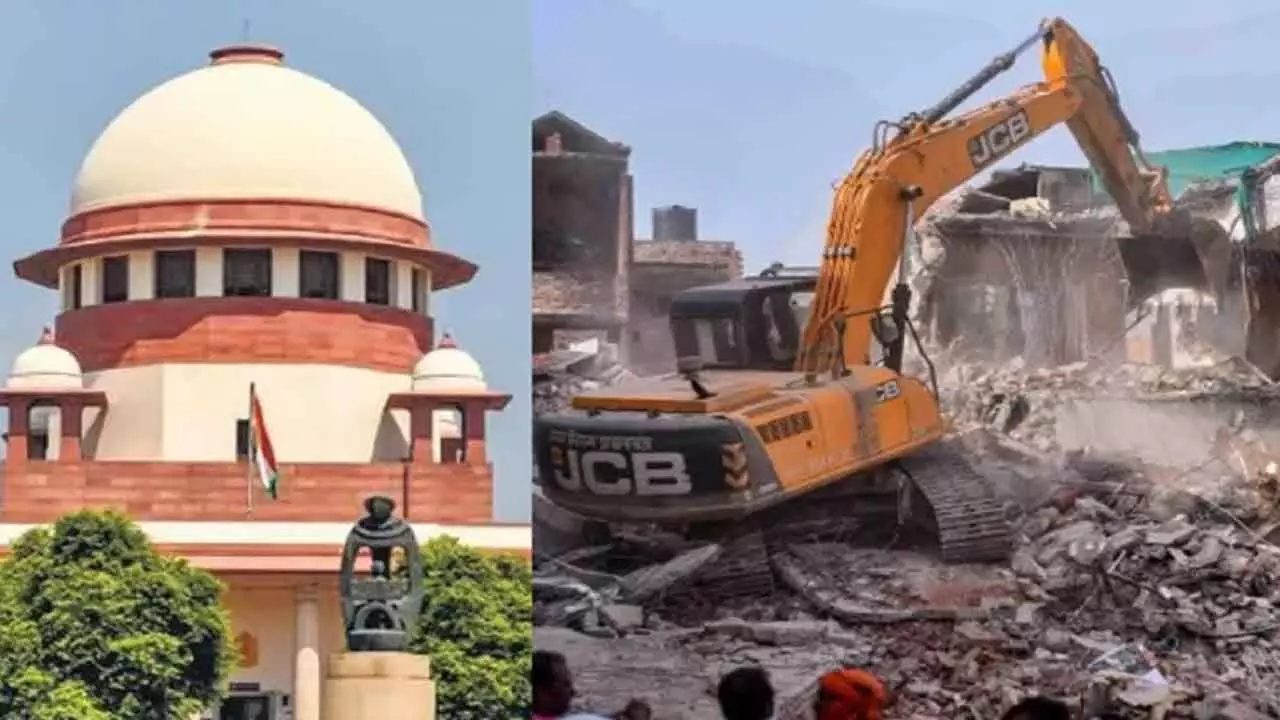Demolitions Without Due Process Unconstitutional: Supreme Court
Says the executive cannot act as a judge, declare someone guilty, and demolish their property without due process
Demolitions Without Due Process Unconstitutional: Supreme Court

New Delhi: The Executive cannot become a judge, decide that an accused is guilty and punish him by demolishing his properties as such an act would be transgressing its limits, the Supreme Court said on Wednesday.
The apex court also observed it will be "totally unconstitutional" for more than one reason if a citizen's house is demolished merely because he is an accused or a convict, that too without following the due process as prescribed by law. A bench of Justices B R Gavai and KV Viswanathan made these observations while delivering its judgement which laid down pan-India guidelines on demolition of properties.
It said the Executive cannot declare a person guilty, as this process is the fundamental aspect of the judicial review. "Only on the basis of the accusations, if the executive demolishes the property/properties of such an accused person without following the due process of law, it would strike at the basic principle of rule of law and is not permissible," the bench said in its 95-page verdict. "The executive cannot become a judge and decide that a person accused is guilty and, therefore, punish him by demolishing his residential/commercial property/properties. Such an act of the executive would be transgressing its limits," it said. The bench said the "chilling sight" of a bulldozer demolishing a building, when authorities have failed to follow the basic principles of natural justice and have acted without adhering to the principle of due process, reminds one of a lawless state of affairs, where "might was right". It said the constitutional ethos and values would not permit any such abuse of power and such misadventures cannot be tolerated by the court of law.
The bench said such an action cannot be done in respect of a person who is convicted of an offence. "Such an action by the executive would be wholly arbitrary and would amount to an abuse of process of law. The executive in such a case would be guilty of taking the law in his hand and giving a go-bye to the principle of the rule of law," it said.
The bench said if the Executive in an arbitrary manner demolishes the houses of citizens only on the ground that they are accused of a crime, then it acts contrary to the principles of 'rule of law'. "If the executive acts as a judge and inflicts penalty of demolition on a citizen on the ground that he is an accused, it violates the principle of 'separation of powers'," it said.
"We are of the view that in such matters the public officials, who take the law in their hands, should be made accountable for such high-handed actions," the bench said. The top court said when it is considering the issue with regard to 'rule of law' and 'separation of powers', it will also have to take into effect the matters where the Executive transgresses its power, acts as a judge and demolishes the structures of persons without following the procedure prescribed by law. "Though the doctrine of public trust has been largely applied by this court in environmental matters, it cannot be disputed that the executive exercises its powers as a 'trustee' of the citizens. Therefore, the executive actions must be consistent with maintaining public trust," it said.
The bench said conversely, when the Executive acts in breach of the principles of 'rule of law' and 'separation of powers', the doctrine of public trust and accountability would come into play. It noted that even in cases consisting of imposition of a death sentence, it is always a discretion available to the courts as to whether to award such an extreme punishment or not.

